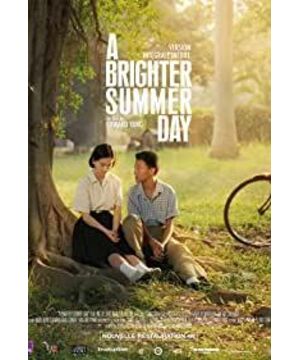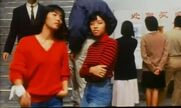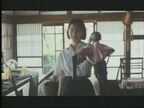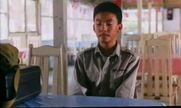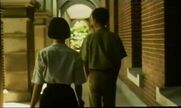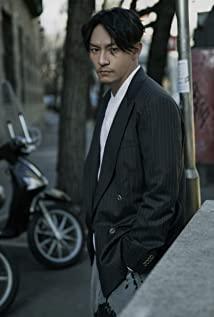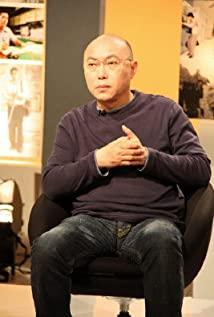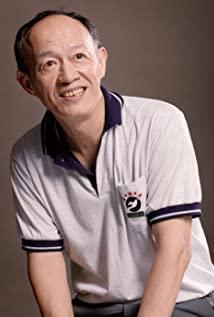Author: Yang Jianwei
On the evening of November 26, 2016, the Taiwan Golden Horse Awards, known as one of the three major awards for Chinese-language films, ushered in its 53rd event. On the main visual poster of the Golden Horse Awards, a boy in a white shirt holds a flashlight and shines a beam of light toward the sky. The boy on the poster is 13-year-old Taiwanese actor Zhang Zhen, whose image comes from the 1991 movie "Guling Street Teenage Murder" (hereinafter referred to as "Guling Street"). In the same year, the American Standard Collection Company released a Blu-ray restored version of "Guling Street", which once again caused a heated discussion among fans. At that time, nine years had passed since the death of the film's director, Yang Dechang.
Time continues to advance, and now we are in the tenth year of Yang Dechang's death. 10 years ago today, Yang Dechang died of colon cancer at his home in Beverly Hills, California, at the age of 60. During his lifetime, he directed 8 films and served as the screenwriter for 7 of them. Among them, "Guling Street", which was adapted from the real murders of Taiwanese teenagers, and "Yiyi", which depicts family affection and the meaning of life, have won numerous awards. Taiwan film scholar and film critic Jiao Xiongping called him "a well-deserved film master" and "a world-class figure", praising his artistic achievements to make everyone proud, and his death made the same generation of Taiwanese directors, "The new film Hou Hsiao-hsien, one of the representatives of the Movement, said with emotion: "An era has passed."
"Although (Yang Dechang's) works are not many, it's not enough if they don't make it. Once they do, they will be amazing. All of them are masterpieces of realism that are rigorous in production, sharp and profound, and are enough to go down in history." Scholar Huang Wenjie commented on Yang Dechang's creations. As a Taiwanese film researcher, Huang Wenjie is the author of the book "Falling Film Rivers and Lakes". On the 10th anniversary of Yang Dechang's death, he wrote "Cynical: Yang Dechang and His Movies" to express his respect for the filmmaker. .
This book not only focuses on exploring Yang Dechang's life experience and the connotation of his films, but also "studies Yang Dechang's confusion, anger and persistence in modern changes as a social reflector and critic". As the title of the book "Cynical" clearly indicates, readers can get a glimpse of Yang Dechang's views on Taiwanese society in the 1980s and 1990s from Huang Shijie's research, creating a more comprehensive and complete image of Yang Dechang outside of the film. .
Dissatisfaction with the status quo of education in Taiwan:
Less liberal ethos, more conservative ideas
In the movie "Guling Street", the Chinese language teacher's statement that "Chinese language is the most reasonable, and foreign language is not comparable" was questioned by students. Not only the questioning student Kitty was punished, but even the innocent male protagonist, Xiao Si, was punished for standing up, just because he didn't answer the teacher's question of "who is booing him". Later, Xiao Si's father went to the school to negotiate because his classmates slickly plagiarized his test papers. Finally, a dispute broke out because he was dissatisfied with the bureaucratic tone of the school leaders, and Xiao Si was recorded as a major demerit. In Huang Wenjie's view, these two episodes not only reflect the deformity of autocratic schools and oppressive education, but also reflect the prejudice and repression that Yang Dechang received during his schooling as a child.
When he was in elementary school, Yang Dechang developed a rebellious mentality against the teacher, and ignored the teacher because he was unfairly punished. Three years later, Yang Dechang's mother had to transfer him to the Primary School Affiliated to Women's Teachers, and he began to study hard and became a "good student in the eyes of everyone".
In 1959, Yang Dechang was admitted to the "Jianguo Middle School" junior high school night department, and the following year was admitted to the day department. This is the same as Xiao Si's experience in "Guling Street". At this time, Yang Dechang "does as he pleases and develops his personality freely", because he thinks that many teachers have a deep misunderstanding of him, and the relationship between the two sides is not very good. He loves to read comics, and was criticized and punished for drawing and circulating comics in class. In the third year of junior high, Yang Dechang met a teacher who he thought had "psychological problems". The teacher used "some classmates reported that Yang Dechang molested the female teacher" as an excuse to repair him, and often forced Yang Dechang to write a letter of repentance. What is the reason? He felt that the teacher "felt that he couldn't hold back his face and had to fix him in front of all the students". In this way, Yang Dechang had an unpleasant junior high school career. He believed that this kind of suppression of students was very common in the educational environment at that time.
"(Yang Dechang) is really disgusted with the educational environment in Taiwan. He often talks about how uncomfortable he was in class in the past, and feels that teachers are suspicious of people. For example, "Guling Street" states that he was in the night club of Jianguo Middle School. When it comes to "Yiyi", everything is suppressed and humiliated by the teacher, which is completely his personal projection." The words of Yang Dechang's former partner and Taiwanese director Wu Nianzhen once again verified Yang Dechang's dissatisfaction with Taiwan's education.
Yang Dechang also met a good teacher. When he was at the National Chiao Tung University, his Chinese teacher, Chen Naichao, gave lectures on a whim, always breaking the rules and allowing students to express themselves freely. In the second semester of freshman year, when writing an essay, Yang Dechang "threw away everything that I thought should be in the essay, and wrote whatever came to my mind", and got the first A. Once, Chen Naichao wrote on the blackboard Guan Zhong's "Those who are capable make wisdom, and those who are foolish are guarded", and asked the students to "go back and think about it." Looking back on this matter, Yang Dechang believes that these 8 words awakened his creative consciousness and had a huge impact on him.
In 1988, after directing 4 films including "Hope" and "A Day at the Beach", Yang Dechang joined the Department of Drama of the Taipei University of the Arts to teach in addition to his film work. There, he was regarded as a different kind of teacher, playing cards unconventionally: he first talked about a current event, and let the students express their opinions, as well as his own opinions; the students sat together at will to discuss together, and even go to the movies Field trainee on the set... This situation continued until 1995, and finally ended with Yang Dechang being fired from the school. The school thought his "deviant teaching method was too radical".
"There is less and less freedom, and more and more conservative thoughts." Yang Dechang sighed with emotion about the situation of Taiwan's education at that time and projected it into his films.
Distrust of Taiwanese media:
Newspapers align with movie distributors and play savior
Yang Dechang has had many unpleasant experiences with reporters. According to the recollection of Chen Yiwen, the Taiwanese director and collaborator of "Guling Street", Yang Dechang was interviewed by the media in Hong Kong once and felt that "the other party did not understand what he said", so he categorically rejected the reporter. Record once" request. Another time in the studio of "Ku", Yang Dechang was so angry that he went downstairs, because the reporter said, "Yang Jingyi is not a beautiful woman, why do you want her to play".
"Basically, Yang Dechang does not trust the media. Yang Dechang will doubt what is true. What the media presents is the front of a person, and what is hidden behind is not seen by others." Ono, co-screenwriter of "Terrorist" Recalling that when writing the press release for the film, Yang Dechang emphasized every time: "We have to control it very accurately, and use the press release to continuously release information so that reporters can't write mistakes."
When "Guling Street" was first released, some reporters, in order to attract attention, commented that the film was "a slander of Taiwanese by a foreigner", which made Yang Dechang stunned. When he protested against the distributor's misappropriation of the Taiwanese government's film subsidy, some media were invited by the distributor to publish some malicious and slanderous articles - "Tell me (Yang Dechang) how to criticize this society and say I don't love Taiwan. , said I was more like a mainlander." This kind of collusion between interest groups made Yang Dechang even more disappointed with the media. He said: "The death of the film is due to the rise of the new wave: Taiwan's print media will always be in the same camp as the major film distributors, because these major distributors are the main customers of print media advertising revenue, and of course, the print media is for distribution. The propaganda effect that businessmen hope to achieve creates a public opinion offensive.”
In the film "Mahjong", Qiu Dong has a line: "So many people watch movies, gossip magazines, best-selling books, and even advertisements every day. What do they do? They want to hear others tell him how to live." Huang Wenjie in The book writes that this is not only a satire and criticism of the world's "don't know what they want", but also a criticism of the media by acting as the savior of the public and creating all kinds of falsehoods to deceive and make money. In an interview with Jiao Xiongping, Yang Dechang said: "The basis of commercial TV and media are big advertisements. This kind of thing is the easiest to fall into. People only make money without paying. In the end, they cheat people and cheat money... Everyone doesn't realize it. This technique of manipulation and exploitation, but the fact that there are hints everywhere, is actually based on the exact same factor, which is to tell you, what you need."
So what does Yang Dechang think the media need to tell the public? In the movie "The Age of Independence", Yang Dechang answered this question. In the film, Molly's sister, a TV host, preaches "love" and "pairs" to overcome loneliness in a highly rated show, calling the world "full of light and full of hope. ". The fact is that she, who has created a happy image of a happy marriage, has already broken up with her husband and has been separated for a long time, but after being pointed out the real situation, she called it a rumor. Molly's brother-in-law has written many sweet romance novels, and the sales are so hot that they "sell better than Qiong Yao", but then he wakes up and reveals that these books "are all drugs, some opium", which are used to comfort the emptiness of the soul product of the masses. More ironically, when he realized this, he changed his writing style and wrote "Confucian Confusion", which he thought truly cared about the public, but Molly, who claimed to have devoted himself to cultural careers for his ideals, could not see the value of this book.
"Portrait Artists Describing the Mental State of Taiwanese":
There is really only one thing between people, and that is the truth.
In "Yang Dechang", the American film critic John Anderson called him "a portrait painter who portrays the mental state of Taiwanese". In Anderson's view, Yang Dechang depicts the survival feelings of modern people in each film, and deeply explores the spiritual crisis and moral crisis of the public in the changing times. It is not difficult to see from this that Yang Dechang has a heavy anxiety about the life of modern people.
The narrative background of "Guling Street" is Taiwan in the early 1960s, a transitional era in which wars and migration have not yet gone away, an era of panic among the whole people - the Kuomintang imposed strict surveillance on the people, and adults lived in the unknown future. In the midst of panic, the equally frightened children seek security by forming gangs. Regarding the murders in reality and movies, Yang Dechang opposed the simplification of the incident: "This murder is not a simple murder. It is the entire environment that contributed to the murder, and the murderer is the entire environment."
In the 1980s, under the transformation of industrialization and modernization, Taiwan created an economic miracle that stunned the world. In the book "Taiwan Four Hundred Years", the author Xu Zhuoyun once described the prosperity of Taiwan and its people at this time as "money floods the feet". In 1992, Taiwan's per capita income had risen from US$137 in 1951 to US$9,591, an increase of 70 times. Yang Dechang saw the spiritual crisis and moral crisis that followed. In an interview with the film "The Age of Independence", he said: "Human civilization has reached this time, and material civilization has also reached this time. In fact, we are in a very crisis stage. The problem that this film is going to talk about comes from us. Spiritual life", "How to rationalize it, make it healthy, and make it more vigorous, this is a very important topic to be discussed in this story."
Characters suffering from mental crisis abound in Yang Dechang's films. Minmin in "Yi Yi" cried and reflected on her life: "I feel like I have been living in vain, I am like a fool every day, what am I doing every day?" Zhou Yufen in "The Terrorist" wrote in the novel: " That day is the first day of spring, if you understand the seasons, the change is just a repetition of reincarnation, and this spring is no different from usual." From the deception of Red Fish in "Mahjong" to the teenagers on Guling Street Crime, Yang Dechang vividly showed people's empty and boring living conditions and moral dilemmas, but he was not discouraged: "I have always believed that 'sincerity' and 'truth' are very important, and the relationship between people is actually very important. There is only one thing, and that is true."
Optimistic critics armed with tragedy:
To criticize society is to have an opinion on society
When we evaluate Yang Dechang's films, we can't get around the word "criticism". In the article "We used to be each other's "terrorists", Ono said that Yang Dechang "doesn't look good on anything, and shoots very coldly, showing the depraved and dark side, so that people don't run away." Yang Dechang himself also responded. However, he said that he criticized it only because he loved Taiwan. "I love Taiwan because I grew up in Taipei, and I love this place. But in the end, there are always people who say, if you really love it, you shouldn't criticize it." As an intellectual, Yang Dechang felt that he "was originally To criticize society is to have an opinion on society.”
The academic circle has reached a positive consensus on the intellectual critical spirit in Yang Dechang's films. For example, Taiwanese scholar Wu Pei-ci praised this: "Yang Dechang's works are rich in rational thinking and intellectual criticism. The strength is strong and unforgettable for viewers, and no one can match it in the Taiwanese film industry." In the book "Yang Dechang's Cinematic World", French scholar Jean-Michel Fu Dong raised his critical attitude to the level of thinking about life: "He uses a critical construction method to make people understand that we really live In what kind of world, what is the source of life, and what kind of ending will the end of life be."
Is Yang Dechang pessimistic? Huang Wenjie writes in the book that tragedy is only a powerful weapon he uses to criticize society. When talking about the movie "A Day at the Beach", Yang Dechang once said: "The continuation of life lies in the bright and splendid hope for the future. The final purpose of this film is to imply this kind of courageous belief." Yang Dechang in Westwood Village, Los Angeles On his tombstone, there is such an inscription - " Dream of love and hope shall never die " (the dream of love and hope will never die).
………………………………
You are welcome to find us on Weibo, please click here .
You can also follow our WeChat public account "Interface Culture" [ID: BooksAndFun]
View more about A Brighter Summer Day reviews


